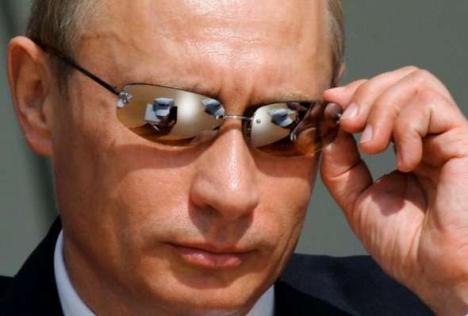Person of XXI. century Russia – Vladimir Vladimiroch Putin

Russia has the world’s largest stockpile of weapons of mass destruction and a lethal nuclear arsenal; it is the world’s second largest oil producer after Saudi Arabia; and it is an decisive player in whatever happens in the Middle East. Russia’s success in the 21 century owes much of one great man and politician, Vladimir Vladimirovich Putin.
Early life and education
Vladimir Putin was born after what the Russians call The Great War, on October 7th, 1952 in Leningrad (now St. Petersburg, Russia). As a teenager the he used to practice handball and played at radio station. He became top-ranked expert at sambo, a type of martial art. He received a high level education in university: he graduated from the law faculty of Leningrad State University, where he specialized in international law. In this point began his political experience because he became member of Communist Party of the Soviet Union.
KGB work experience
After graduation he applied and in final was accepted to work in KGB, in the branch where he was responsible recruiting foreigners who would to gather information for KGB intelligence. After his marriage, with Ludmila, KGB sent him to Dresden, East Germany. He enjoyed his time there, the culture and Germans people, unlike to others KGB agents. Putin came back to Russia in 1990 and one year later than the Soviet Union was falling apart he left his job in KGB with the rank of colonel and get involved in politics.
Russian politics
Vladimir Putin used to work for Anatoly Sobchak, the mayor St. Petersburg and in 1994 became deputy mayor. Already in that time, above his influence the second capital of Russia, St. Petersburg developed. After the defeat of Anatoly Sobchak, Putin gave up his post and moved to capital Moscow. In 1998, Putin was appointed as deputy head of management in Boris Yeltsin’s presidential administration, in charge of Kremlin’s relations with the regional governments. Year later, he was named secretary of the Security Council, a body that advices president on the matter of foreign policy, national security, military and law enforcement. In 1999, because of health issued, president of that time Yeltsin, appointed Putin in his place. Many people didn’t trust in the success of Putin because he had a little political experience and also his personality seems to be quite boring. Nevertheless, in a short time he meaningfully increased his popularity among citizens by pursuing the war in Chechnya. He didn’t blaming various bombing in Moscow and elsewhere on Chechen terrorists, he also used harsh words in criticizing his enemies.
When he became president in 2000 he found his country on the approach of becoming a failed state. With his determined persistence, a high-pitched vision of what Russia should become the spirit of Mother Russia; Putin has put his country back on the map. Even if, he was president, he will continue to lead his country as its Prime Minister and tried to transform it into a new kind of nation, bound to neither East nor West.
Putin is considered the person of 21st century person because he is a clear-eyed recognition of the world and one of the most powerful individuals. And maybe he is not a democrat in any way that the West would define it and he is not a model of free speech but he stands, first of all, for stability—stability before freedom, stability before choice, stability in a country that has barely seen in Russia for a hundred years. He proved to be a reformer or an autocrat and an extraordinary leadership who took the country back to the table of world power. Vladimir Putin in a key player on the world stage for making Russian a great world power. His efforts to reignite the forces of Russian imperialism by intimidate former Soviet republics, a likely recognition of the efforts being made by the breakaway ethnic Russian enclaves of Abkhazia and South Ossetia in Georgia to achieve independence, Russia’s drawing from the Conventional Forces in Europe treaty and Putin’s own efforts to improve his cult of personality and his political power at home should be of deep concern to any and all Russia-watchers.
Putin’s importance is shown by the desperate attempts by his enemies to discredit him: a new website similar to WikiLeaks was founded in January 2011, and it started it’s activity by posting pictures of a great castle on the shore of the Black sea. Authors claimed that this building belongs to Putin, though it’s not presented in his disclosure of his assets. It turned out that the website tried to disgrace him by feeding false informations like this about him.


